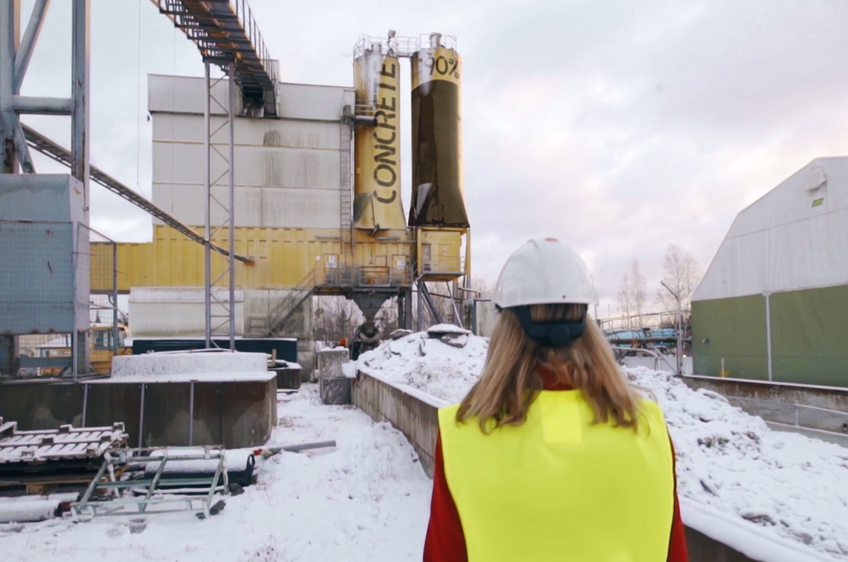
Concrete industry
Concrete is the most used construction material in the world and it has enabled urban development across practically the whole of our society. The roadmap for climate neutral concrete is closely linked to the roadmap for cement because cement accounts for about 90 percent of the climate impact of concrete.
Targets in roadmap
2023: Possible to achieve a 50% reduction in the climate impact of concrete for house building.
2030: Climate-neutral concrete on the market.
2045: All concrete in Sweden climate neutral.
To implement the roadmap, the industry is working on:
- using cement that has been developed with a lower climate impact.
- optimising the composition of concrete, replacing parts of the cement with alternative binders.
- contributing towards resource-efficient construction with material optimisation.
- contributing towards ensuring that the right concrete is used in the right place, i.e. avoiding higher concrete quality than necessary for the bearing capacity and durability of the building.
- lower climate impact from transport.
To achieve the aim of climate neutral concrete, there is also a need for technological advances in the cement industry, with carbon capture and storage/utilisation (CCS/CCU).
The industry organisation Svensk Betong is responsible for the roadmap implementation process. The roadmap was produced with a number of actors from the whole value chain in the Swedish Concrete Initiative, working together for climate-neutral concrete.
Progress since the roadmap was launched
Climate-improved concrete for a 50% cut in climate impact today
Depending on the type of construction, it is already possible to achieve a 50 percent reduction in climate impact from concrete by using climate-improved concrete. The concrete industry is now working on a knowledge boost to encourage other actors in the value chain to use climate-improved concrete in projects.
Revised concrete standard
The revision of the Swedish application standard for concrete (SS137003) to be completed in autumn 2021 will open up wider opportunities to use alternative binders to cement in the further development of climate-improved concrete.
Research project for more rapid implementation of the roadmap
BetCrete 2.0 is a research project that is co-funded by Sweden’s innovation agency Vinnova for two years (2020–2022) Vinnova. The purpose of the project is to support and increase the pace of implementation of the roadmaps for concrete and cement, for example through research into alternative binders such as calcined clays.
The technological transition of the cement industry
Cementa has made a decision to invest in introducing CCS (carbon capture and storage) throughout its cement factory in Slite from 2030, which will enable climate-neutral cement manufacture.
Industry challenges
In many cases, the target of a 50 percent reduction in climate impact for concrete used in house building by 2023 can already be met today. The challenge lies in ensuring that climate-improved concrete is really ordered and that procurements make climate requirements based on a lifecycle perspective. The Riksdag has decided to introduce a statutory requirement for climate declarations on buildings from January 2022 but the requirement only involves declaring the manufacturing and construction processes and not the whole lifecycle.
The technological transformation in the cement industry depends on Cementa’s opportunities to run its operations on Gotland, which is currently uncertain. Even with a renewed permit, the development of CCS technology introduces a number of questions linked to risks and funding. The technological transformation demands major investments and risk-taking and risks being slowed by slow and unpredictable permit processes for the business and for access to electricity.
Standards and regulations govern the proportion of alternative binders that can be used. Because continuous development is underway to safeguard the durability of concrete, regulations and standards need to keep pace so as not to slow progress.
- Aggregates industry
- Agricultural sector
- Automotive industry – heavy transport
- Automotive industry – passenger cars
- Aviation Industry
- Cement industry
- Concrete industry
- Construction and civil engineering sector
- Digitalisation consultancy industry
- Electricity sector
- Fast moving consumer goods industry
- Food retail sector
- Forest sector
- Gas sector
- Heating sector
- Heavy road haulage industry
- Maritime industry
- Mining and minerals industry
- Petroleum and biofuel industry
- Recycling sector
- Ski resort sector
- Steel industry
- The Innovation and Chemical Industries
Process owner: The Swedish Concrete Initiative
Published: 2018




